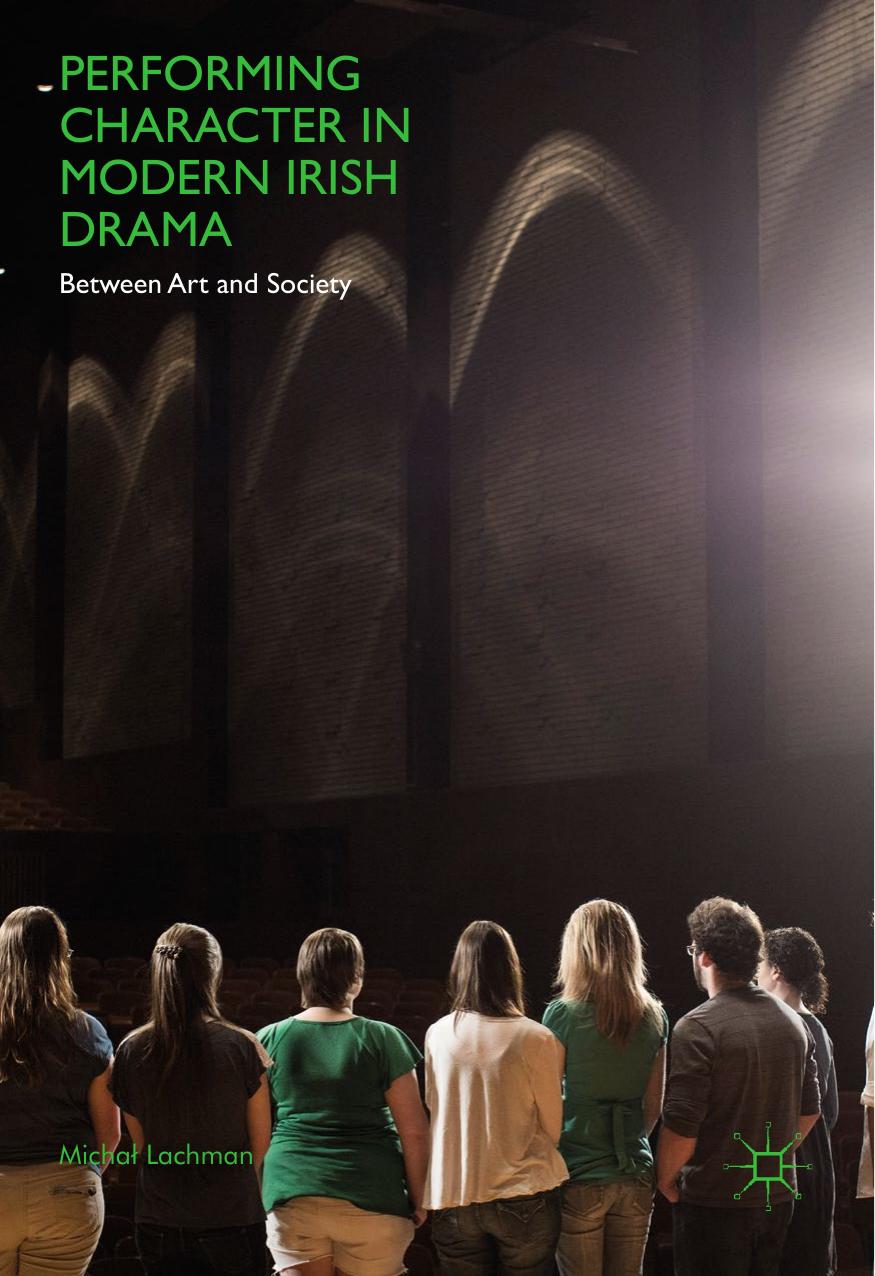Performing Character in Modern Irish Drama by Michał Lachman

Author:Michał Lachman
Language: eng
Format: epub, pdf
Publisher: Springer International Publishing, Cham
PUBLIC: (Sweet, demure) And I’m glad to be here, Sir.
PRIVATE: Handsomely said, young man. I hope you’ll be happy with us and work hard and one day maybe you’ll be president of the biggest chain of biggest hotels in the world.
PUBLIC: That’s my ambition, Sir. (Friel 1996c, 35)
It is interesting to see that both the public and the private selves are engaged in such theatricalisations. Friel’s division into the external and internal persona of the protagonist does not simplify the view by making the visible self artificial and the invisible self authentic. Both are theatricalised, looking for shelter in linguistic constructions that often cushion off emotions too intense to be faced head on.
The way in which Friel shapes his protagonist reflects linguistic interests of the early post-war epoch. Gar more or less consciously and dramatically uses borrowed languages. His imitation of the “heavy US accent” (Friel 1996c, 35) or his speaking with the “reverential tones of a radio announcer” (Friel 1996c, 36) replace the living person with the grammatical subject. In this sense, the human becomes “oblique”, as Barthes would say, and the speaker “slips away” (2001, 313). Instead of the speaking character, we encounter a figure who wishes to hide behind linguistic forms that he has found floating around and employed as protective shields. No matter what existential or psychological reasons stand behind this defensive gesture, he is in a general sense what Barthes aptly termed an “eternal copist” or “modern scriptor” (2001, 315). Up until a certain point in Friel’s play, Gar does not create his own language, but imitates existing structures that exist prior to the act of uttering them. Similarly to Barthes’s author who “can only imitate a gesture that is always anterior, never original” (2001, 315), Gar avails himself of the unoriginal but accessible language routines. All this does not naturally mean to prove that Friel was an avid reader of Barthes’s critical essays. It merely points to some significant parallels in thinking about language and character or the subject which existed across geographic and theoretical divides in Europe after the war. It also points to the common obsession with language as a tool of empowerment and simultaneously as a threat of entrapment; the potential path to discovering the elusive condition of the speaking subject and a medium with absolutely no innocence in transferring human experience. Language was seen as a hydra with double heads: a Wittgensteinian system of internally driven rules and the Heideggerian mode of dwelling in the world.
Therefore, it is particularly significant to see the shift in Gar’s language: first, he speaks the plethora of borrowed languages, then he moves on to realise how artificial they are and attempts to engage in straightforward communication. This is where Friel really plots his own path through late modernist literature—by looking for tentative and elusive authenticity in language structures and their use. When the moment of Gar’s departure nears, he feels a compelling need to break the defensive lines of the language routine which he and his father have accumulated over the years.
Download
Performing Character in Modern Irish Drama by Michał Lachman.pdf
This site does not store any files on its server. We only index and link to content provided by other sites. Please contact the content providers to delete copyright contents if any and email us, we'll remove relevant links or contents immediately.
Call Me by Your Name by André Aciman(20501)
Ready Player One by Cline Ernest(14645)
How to Be a Bawse: A Guide to Conquering Life by Lilly Singh(7472)
Wiseguy by Nicholas Pileggi(5771)
The Kite Runner by Khaled Hosseini(5170)
On Writing A Memoir of the Craft by Stephen King(4936)
Audition by Ryu Murakami(4924)
The Crown by Robert Lacey(4807)
Call me by your name by Andre Aciman(4676)
Gerald's Game by Stephen King(4642)
Harry Potter and the Cursed Child: The Journey by Harry Potter Theatrical Productions(4503)
Dialogue by Robert McKee(4389)
The Perils of Being Moderately Famous by Soha Ali Khan(4217)
Dynamic Alignment Through Imagery by Eric Franklin(4208)
Apollo 8 by Jeffrey Kluger(3705)
The Inner Game of Tennis by W. Timothy Gallwey(3682)
Seriously... I'm Kidding by Ellen DeGeneres(3629)
How to be Champion: My Autobiography by Sarah Millican(3591)
Darker by E L James(3512)
